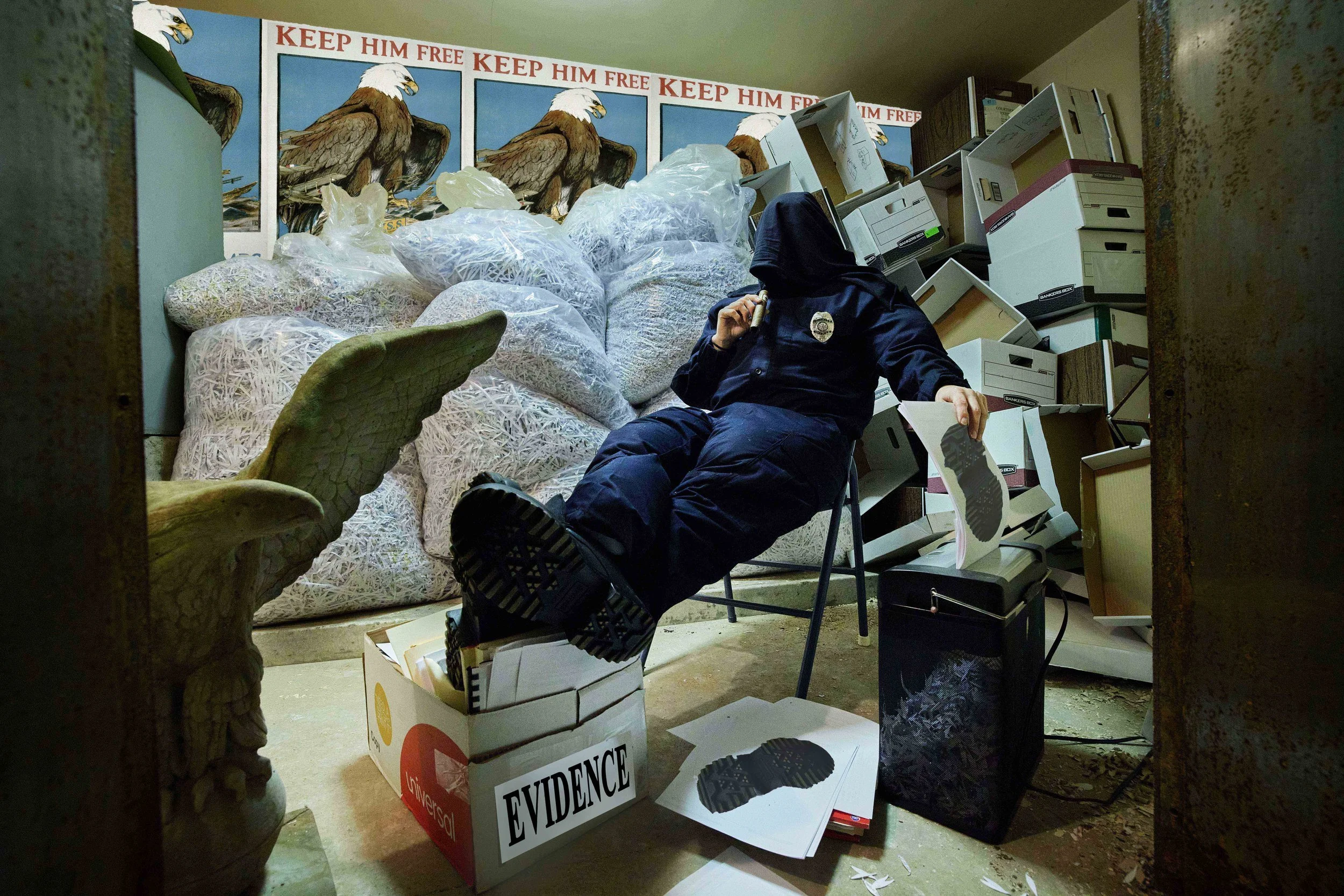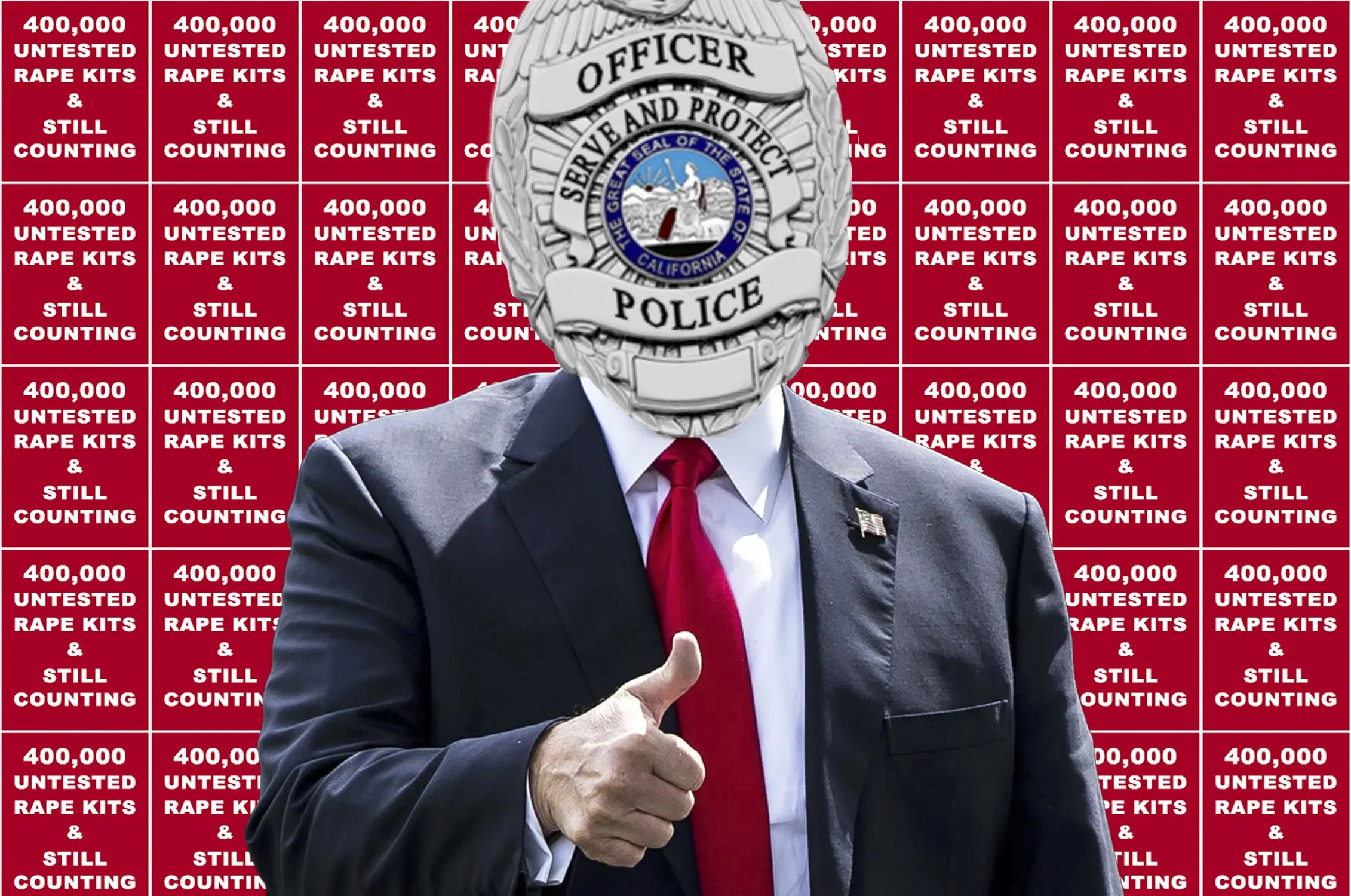You Have the Right are staged narrative photographs. I am looking at the ways sexual assault is handled, perpetuated, and participated in by the police, media, legal systems, and justice systems.
I am thinking about cultural beliefs and actions that normalize and perpetuate gendered violence and rape culture. Looking at abuses of power, impunity, harmful media representations, misinformation, and how gender and sexuality are used as a construct to marginalize.
I photograph a cisgender male and myself in multiple personas, representing both the cops and everyday citizens, based on concepts derived from research and the stories of others. The images are also made to reference depictions in mass media, such as the news, movies, television, and advertisements. I use constructed life size sets, appropriated imagery, photoshop, and disguises. Large-scale versions of the work are meant to be displayed publicly at locations synonymous with justice. My first set of photographs were projected onto police stations.
As the artist, my identity and gender are kept anonymous - to explore how this expands and complicates the work. I am looking at gender biases, male gaze, and peoples understanding of how gender influences their thoughts and acceptance of violence towards certain gendered bodies and not others. I am thinking about the ability to be granted safety behind anonymity, men’s right activists, internet trolls, incels, as well as cops’ impunity and ability to hide behind their badge. I am interested in using the concept of anonymity as a reverse weapon of resistance, to grant myself impunity and safety to speak out against a system that victim shames the innocent, and allows the guilty to roam freely, unidentified among us.
Ongoing notes during this project
-There can be a tendency for people to look the other way or not want to engage in viewing painful and complex topics such as these, so how do I create art that is so compelling and complex that people can’t help but look at it? Rothko once said, art is not about an experience, it is an experience. I think it is both. But, so far I have focused on making art about an experience and I am looking for more ways to make art that is an experience.
-Handling of rape kits, certain gendered bodies being sexualized, objectified and dehumanized.
-I am asking questions like: what are ways to critique western cultural frameworks that construct gender norms and place those they categorize as women or fem as sexual objects exclusively for cis-male desire? What is the power in dehumanizing a human into a sexual object in media and how does it translate into the real world? How does manipulating/distorting all gendered bodies in my images disorient the viewer so they have to question what’s going on before they can objectify anyone? Do they notice the violence or the distortions on the body they perceive to be female? Do the distortions/manipulations stop the male gaze from fixating on erotic pleasure? How far does the body manipulation have to go for it not to be sexualized? How far does body manipulation go behind the scenes in Hollywood/advertising to make sure the body is sexualized? How do I interrupt uninhibited voyeuristic access granted for viewing bodies categorized as female/fem? What are other ways to critique depictions of how specific genders have been displayed, such as objects for consumption and domination? Will it make people question what is an appropriate way to display, depict and view bodies they deem fem? What ways can I get people to consider both the experiences of their own gender and that of others? I take on the role of police officers to critique police officers, how can I expand on this to show I am not only critiquing police officers? What forms of dissemination am I using?
-If this is a discussion about reforming systems such as the police, justice system and harmful portrayals in media, and not exclusively a statement about defunding the police, how do I make that clear? Do I need to make that clear. We have a systematic problem that needs more attention and thought-provoking work to bring it to the forefront of discussion to create social change. In my work I look at police, justice system and media which are major contributing factors to perpetuating gendered violence and sexual assault. Police officers need different rules and training about how to handle cases of sexual assault and the victims of these crimes, only 4 hours on average are devoted to sexual assault training in police academies, only 4% of agencies have officers that only look at human trafficking in their area, and there is a massive problem with police misconduct. In topics around de-funding police departments - task forces for sexual assault and sex trafficking may be some of the first to go, so what solutions do we have? How do I address or present these questions to expand the discussions on how we create change?







